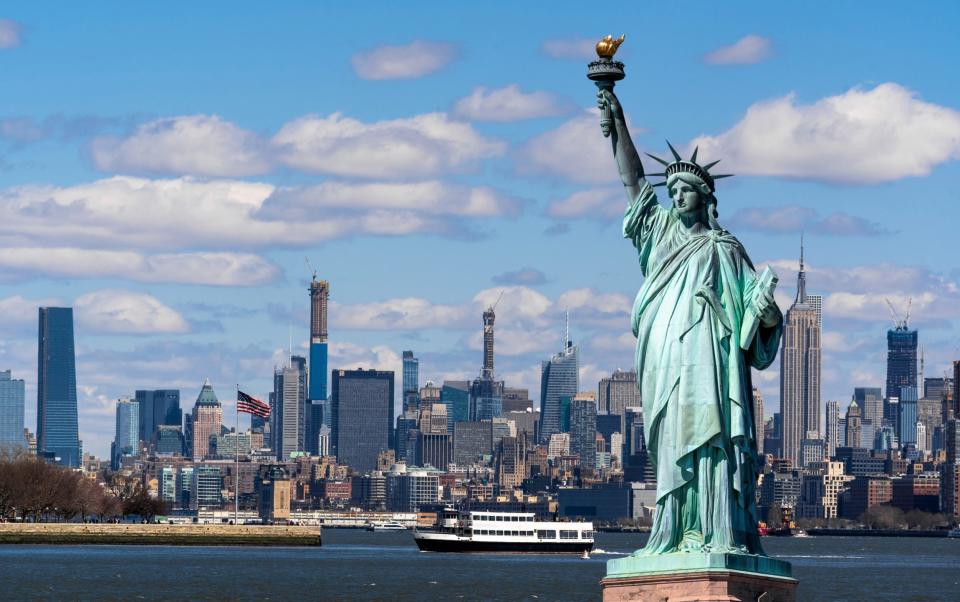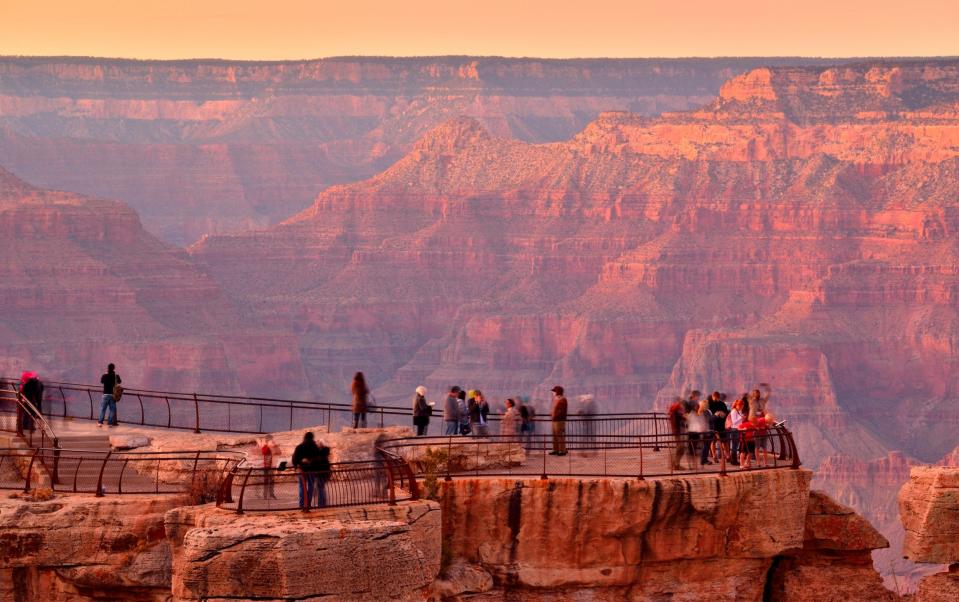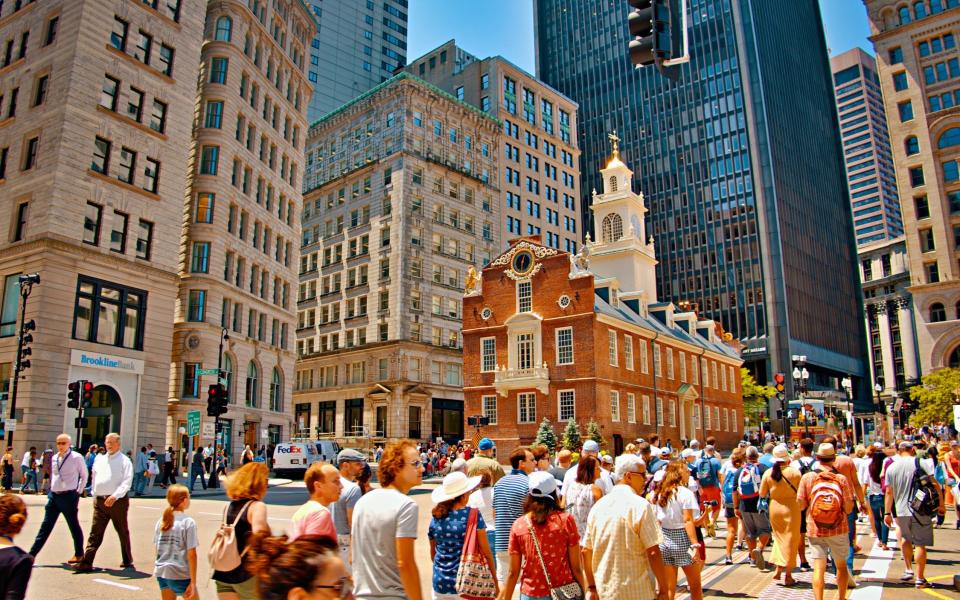The statistics prove it – America is the greatest country in the world for tourists

It was either Mark Twain or Benjamin Disraeli who came up with the adage about “lies, damned lies, and statistics”, and the possible unreliability of big numbers used to bolster otherwise flimsy arguments. Twain once declared that he took the phrase from the former British prime minister, even though it does not appear in Disraeli’s papers, and there is no recorded incident of him saying it. So perhaps Twain should take the plaudits. He was, of course, a man – the real-life Samuel Clemens – who spent his career behind a pen-name, so giving him the credit for a few wise words about dissembling is probably appropriate.
Still, whatever and whoever the origin, those five bons mots tend to jump to mind when you are presented with a significant survey, packed with weighty figures and calculations.
Such is the situation with the Travel and Tourism Development Index (TTDI) – a biennial report, produced by the World Economic Forum, whose 2024 edition was published last month. This is only the second version of this mighty tome – but the first (the inaugural document came out in 2022) to look at the state of the global tourism industry without the tentacles of Covid restrictions wrapping themselves around its findings.
With this in mind, it should be no surprise that the key focus is on the planet’s recovery. The dominant headline is that international travel has pretty much returned to the levels which existed immediately prior to the pandemic. But only just – with the sector a mere 0.7 per cent up on where it was in 2019, and only then, if scores are averaged out across the entire globe.
This was probably obvious on your last trip to an airport, where the queues and delays that were de rigueur before Covid have regained their length, and their regularity. In short, people are travelling again, much as they did five years ago. Onwards and upwards.
But if you peer below this top “discovery”, the TTDI also serves up a range of intriguing titbits and chunks of information – chiefly its ranking of 119 countries in order of their strength as travel destinations. In this case, “strength” means “being good at being a place people can and want to visit, based on a variety of factors”.

Which, in no particular order, equates to important matters such as travel infrastructure (airports, road networks and the like, to make sure you can get around), safety and security (is it safe to go there and stay there?), natural and cultural resources (is there nice, interesting stuff to gawp at, and is it all properly protected?) – and, perhaps most crucially, the prioritisation of tourism (is tourism actively wanted and promoted, rather than tolerated and endured?).
All solid metrics, you might say. Although they are also the sort of metrics which point to developed economies and wealthy countries. Inevitably, the upper reaches of the list they add up to contains no genuine shocks or unexpected outliers. The top 10 is crowned by the United States, with Spain in second and Japan (the winner in 2022) in third. Then come France in fourth, Australia in fifth, Germany in sixth and Britain in seventh. China (eighth), Italy (ninth) and Switzerland (10th) complete the membership of this elite club.
A club with, as it happens, scant turnover in membership. Of the 10 countries mentioned above, nine made the top 10 in the 2022 edition of the report – the sole difference, apart from a slight change in order, being China’s leap from 12th, at Singapore’s expense (the island republic was ninth in 2022, but drops to 13th in 2024). Both the 2022 and 2024 top 10s make sense.

Leaving aside the recent anti-tourism protests in Mallorca and Tenerife, which suggest that parts of Spain are no longer delighted to be swamped by summer sunbathers (and putting on hold the exasperation you felt the last time you tried to take a train across the UK), logic is alive and well here. These are major nations where things, generally, work – certainly, well enough that you might want to spend time there.
But it is the US’s rise to the summit which makes the most sense. Its second place in the 2022 poll surely reflected the White House’s relative slowness in reopening the borders as Covid’s powers waned – it was as late as November 2021 when the likes of New York JFK, Washington Dulles and LAX began to refill with international tourists. But with the virus fully in retreat, and America’s airports fully open again, that anchor is now raised.
You might argue that the likes of JFK and LAX are curious examples to cite if you want to make the case that the US is a welcoming holiday destination. The passport desks at the country’s busiest airports are rarely places where you encounter a smiling face and a sunny outlook – what with all the questions about what you are doing there, how long you intend to stay, and whether you are carrying the sorts of sheaves of banknotes which indicate that you are an undercover narcotics baron, or plan to move to Ohio on the quiet.

But once you have leapt the twin hurdles of the fingerprint scan and the steely glare, America really is a welcoming place. Those effusive exhortations to “have a nice day” – or the giddy yelp of “perfect choice” that accompanies even your most standard breakfast order in a downtown diner – may not always be voiced with absolute sincerity, but the US has long adopted the stance that a bright disposition is better than a grimace and a frown.
And yes, you may pay more for this service culture, in up to 20 per cent tagged onto the bottom of your bill. But ask yourself this: Do you prefer the enthusiasm and coffee refills of the Miami restaurant to the shrug and insouciance of the Parisian waiter?
Besides, however (in)sincere the greeting, there is plenty of authenticity elsewhere. From the Grand Canyon and Yosemite to Big Bend and the Badlands of South Dakota, there is a depth and a beauty to much of the American landscape, and the national parks that keep it sacrosanct. From Boston to Seattle via Austin, San Diego, Nashville and Denver, there are cities alive with cuisine and culture.

And, better still, you can travel between them. The intricate web that is America’s air and road networks (the train system is something of a slower process) means that you can hop easily from A to B and on to J – and that, if you want to stop in Detroit, Albuquerque, Phoenix, Omaha or St Louis en route, you can.
Admittedly, you can find much of the above in 2022 table-topper Japan, where the welcome is more restrained, but always polite, and a world-class rail operation links the neon lights of Tokyo to the temples of Kyoto – and the ghost stories of Nagasaki beyond.
Maybe, if time allows, you should take a tour of both. Compare and contrast, and all that.
But then, to return to Twain and/or Disraeli, there are “lies, damn lies and statistics”. And while an elevated position in the Index is surely a fair guarantee of the quality of a destination, so a place towards the bottom is not the damning indictment you might believe.
The lower reaches of the report make mention of Jamaica (84th) and Trinidad and Tobago (89th) – both home to some of the planet’s most glorious beaches, with warm weather to match. They also include Morocco (82nd) and Tunisia (83rd), where history and scenery shimmer and shake in souks, deserts and mountains. And it finds space for Zimbabwe (110th) – where the safari zones are alive with roar and claw.
True, your journey may be a little stodgier. You cannot zip around these countries on bullet trains, nor expect flawless phone coverage in every square metre. But travel has always been about more than survey metrics, or the large numbers used to back them up.


